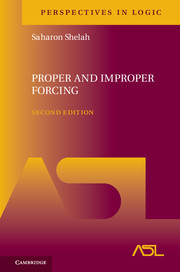Book contents
- Frontmatter
- Dedication
- Contents
- Introduction
- Notation
- Content by Subject
- Annotated Content
- I Forcing, Basic Facts
- II Iteration of Forcing
- III Proper Forcing
- IV On Oracle-c.c.,the Lifting Problem of the Measure Algebra, and /finite Has No Non-trivial Automorphism
- V -Properness and Not Adding Reals
- VI Preservation of Additional Properties, and Applications
- VII Axioms and Their Application
- VIII K-pic and Not Adding Reals
- IX Souslin Hypothesis Does Not Imply “Every Aronszajn Tree Is Special”
- X On Semi-Proper Forcing
- XI Changing Cofinalities; Equi-Consistency Results
- XII Improper Forcing
- XIII Large Ideals on
- XIV Iterated Forcing with Uncountable Support
- XV A More General Iterable Condition Ensuring N1 Is Not Collapsed
- XVI Large Ideals on Hi from Smaller Cardinals
- XVII Forcing Axioms
- XVIII More on Proper Forcing
- Appendix On Weak Diamonds and the Power of Ext
- References
- More References
Introduction
Published online by Cambridge University Press: 06 April 2017
- Frontmatter
- Dedication
- Contents
- Introduction
- Notation
- Content by Subject
- Annotated Content
- I Forcing, Basic Facts
- II Iteration of Forcing
- III Proper Forcing
- IV On Oracle-c.c.,the Lifting Problem of the Measure Algebra, and /finite Has No Non-trivial Automorphism
- V -Properness and Not Adding Reals
- VI Preservation of Additional Properties, and Applications
- VII Axioms and Their Application
- VIII K-pic and Not Adding Reals
- IX Souslin Hypothesis Does Not Imply “Every Aronszajn Tree Is Special”
- X On Semi-Proper Forcing
- XI Changing Cofinalities; Equi-Consistency Results
- XII Improper Forcing
- XIII Large Ideals on
- XIV Iterated Forcing with Uncountable Support
- XV A More General Iterable Condition Ensuring N1 Is Not Collapsed
- XVI Large Ideals on Hi from Smaller Cardinals
- XVII Forcing Axioms
- XVIII More on Proper Forcing
- Appendix On Weak Diamonds and the Power of Ext
- References
- More References
Summary
Even though the title of this book is related to the old Lecture Notes “Proper Forcing”, it is a new book: not only did it have six new chapters and some sections moved in (and the thirteenth chapter moved out to the author's book on cardinal arithmetic), but the old material and also the new have been revised for clarification and corrected several times.
Now, twenty years after its discovery, I feel that perhaps “proper forcing” is a household concept in set theory, and the reader probably knows the basic facts about forcing and proper forcing. However we demand no prerequisites except some knowledge of naive set theory (including stationary sets, Fodor Lemma, strongly inaccessible, Mahlo, weakly compact etc.; occasionally we mention some large cardinals in their combinatorial definitions (measurable, supercompact), things like 0# and complementary theorems showing some large cardinals are necessary, but ignorance in those directions will not hamper the reader), and the book aims at giving a complete presentation of the theory of proper and improper forcing from its beginning avoiding the metamathematical considerations; in particular no previous knowledge of forcing is demanded (though the forcing theorem is stated and explained, not proved). This is the main reason for not just publishing the additional material in a shorter book. Another reason is the complaints about shortcomings of the Proper Forcing Lecture Notes.
Forcing was founded by Cohen's proof of the independence of the continuum hypothesis; Solovay and many others developed the theory (works prior to 1977). Particularly relevant to this book are Solovay and Tennenbaum [ST] and Martin and Solovay [MS], Jensen (see [DeJo]), Silver [Si67], Mitchell [Mil], Baumgartner [Bl], Laver [LI], Abraham, Devlin and Shelah [ADS:81]. We do not elaborate here on the history of the subject (but of course there are credits and references to it in each chapter or in its sections, e.g. on Baumgartner's axiom A see VII §4). And in the first two chapters we review classical material.
Our aim is to try to develop a theory of iterated forcing for the continuum. In addition to particular consistency results that are hopefully of some interest, I try to give to the reader methods which he could use for such independence results. Many of the results are presented in an “axiomatic” framework for this reason.
- Type
- Chapter
- Information
- Proper and Improper Forcing , pp. xv - xxPublisher: Cambridge University PressPrint publication year: 2017

